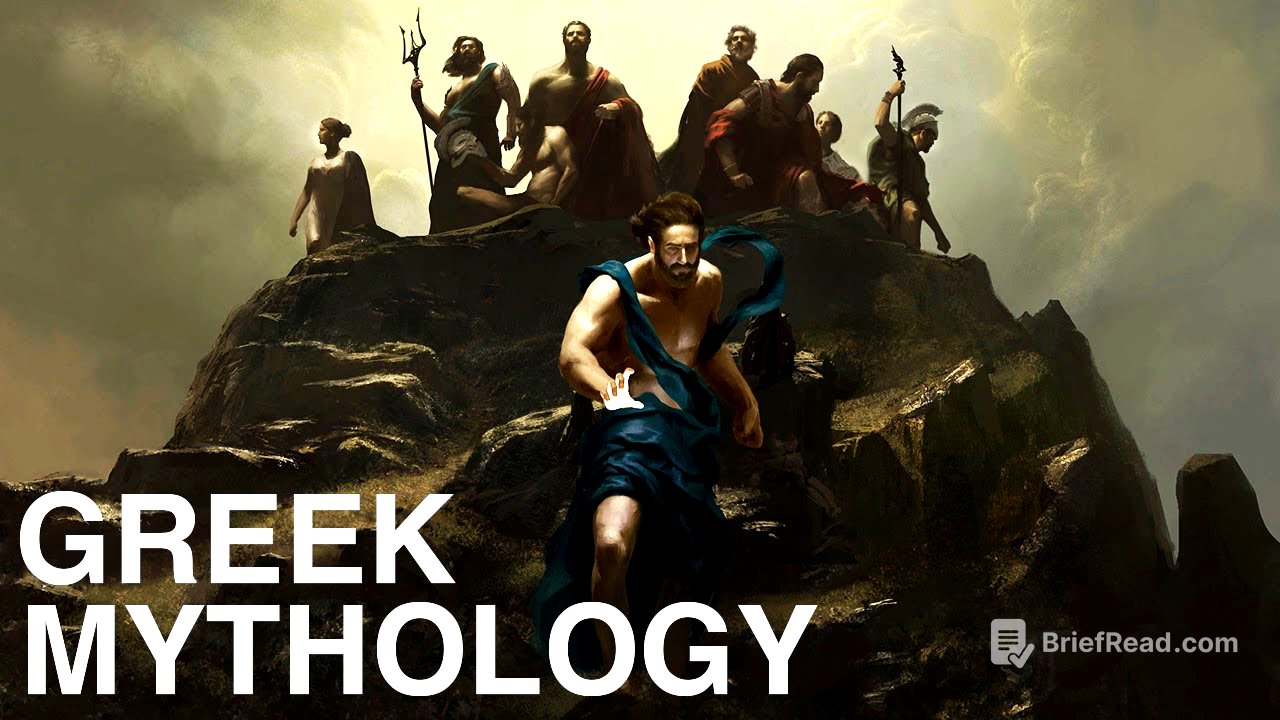TLDR;
This video provides a comprehensive overview of Greek mythology, starting from the creation of the cosmos and the rise of the Olympian gods, to the age of heroes and the Trojan War. It explores the stories of key figures like Zeus, Prometheus, Pandora, and Heracles, detailing their roles, conflicts, and legacies. The video also touches on themes of love, revenge, fate, and the relationship between gods and mortals, offering a structured narrative of the rich tapestry of Greek myths.
- Creation of the cosmos and the rise of the Titans and Olympians.
- The creation and punishment of mankind, including the stories of Prometheus and Pandora.
- The reigns and relationships of the Olympian gods, focusing on Zeus, Hera, Apollo, Artemis, Poseidon, Athena, Aphrodite, and Hades.
- The Heroic Age, featuring the adventures of Cadmus, Perseus, Oedipus, Jason, and Heracles.
- The Trojan War, its causes, key events, and the aftermath for its heroes.
The Beginning [1:35]
In the beginning, there was only chaos, from which emerged Gaia (Earth) and Eros (Love), followed by Night, Day, and Tartarus (the deepest depths). Gaia then birthed Uranus (the Sky), and together they produced the twelve Titans. Uranus cruelly imprisoned the Titans within the Earth, prompting Gaia to create a sickle for her youngest son, Cronus. Cronus castrated Uranus, and from the sea foam arose Aphrodite, goddess of love. Cronus then became the ruler, but fearing a prophecy that his own child would overthrow him, he swallowed his children as they were born. Rhea, his wife, saved their youngest, Zeus, by hiding him on Mount Ida in Crete and feeding Cronus a rock instead.
The Rise of Zeus [4:13]
Zeus grew up in secret and eventually returned to overthrow Cronus, freeing his siblings from his father's stomach. A ten-year war ensued between the Gods and the Titans. Zeus released the hundred-handed giants and the Cyclops from the depths of the earth, who then forged powerful weapons for the gods: Zeus's thunderbolt, Poseidon's trident, and Hades's hat of invisibility. The Titans were defeated and imprisoned in Tartarus, with Atlas receiving the special punishment of holding the sky on his shoulders. Zeus, Poseidon, and Hades divided the realms, with Zeus taking the sky, Poseidon the sea, and Hades the Underworld. Zeus and his fellow gods then established their home on Mount Olympus, becoming known as the 12 Olympians.
The Creation of Mankind [5:53]
Prometheus, sympathetic to the primitive state of humans, fashioned them from clay in the image of the gods. He then gifted them fire, enabling them to develop tools and civilization. Zeus, displeased with humanity's lack of gratitude, demanded animal sacrifices. Prometheus tricked Zeus by presenting him with bones covered in fat, keeping the meat for humans. Enraged, Zeus took fire away from mankind, but Prometheus stole it back, leading to his punishment: being chained to a mountain where an eagle devoured his liver daily. Zeus further punished humanity by creating Pandora, the first woman, who opened a box releasing all evils into the world, leaving only hope inside.
The Great Flood [10:29]
The Golden Age of Man ended, followed by the Silver and Bronze Ages, during which humanity became corrupt and warlike. Disgusted, Zeus unleashed a great flood to wipe out humanity. Only Pyrrha, daughter of Pandora, and Deucalion, son of Prometheus, survived, having been warned and built an ark. They repopulated the earth by throwing stones behind them, which transformed into men and women.
The Reign of Zeus and His Wives [15:59]
Zeus, the King of the Gods, ruled from Mount Olympus, known for his infidelity and numerous wives. His first wife was Metis, the goddess of wisdom, whom he swallowed to prevent a prophecy that her son would overthrow him. However, Metis gave birth to Athena inside Zeus, who emerged fully grown from Zeus's head. Zeus's second wife was Themis, the Titan of justice, with whom he had the Three Fates, goddesses of destiny. His seventh and final wife was his sister Hera, the goddess of women and marriage, though his infidelities continued. One notable affair was with Europa, whom he abducted in the form of a white bull, leading to the naming of the continent Europe.
Hera's Vengeance [21:09]
Hera, the Queen of the Gods, was known for her vengeful nature, often targeting Zeus's lovers and their offspring. She transformed Io, one of her priestesses and a lover of Zeus, into a cow and imprisoned her, guarded by the hundred-eyed monster Argus. Hermes slew Argus to free Io, and Hera set Argus's eyes on the tail of the peacock. Hera also tormented Leto, another of Zeus's lovers, forbidding her from giving birth on land. Leto eventually gave birth to Apollo and Artemis on the island of Delos. When Queen Niobe mocked Leto for having only two children, Apollo and Artemis killed all of Niobe's fourteen children, and Niobe was turned into a weeping rock.
Apollo and Artemis [26:51]
Apollo, god of archery, light, and music, slew the serpent Python and established the Oracle of Delphi. After mocking Eros, Apollo was struck with a gold arrow, causing him to fall in love with Daphne, who, fleeing from him, was transformed into a laurel tree. Apollo's son, Asclepius, was a skilled physician who could raise the dead, angering Hades. Zeus killed Asclepius but later resurrected him as the god of healing. Artemis, goddess of the hunt and Apollo's twin, turned the hunter Actaeon into a deer for accidentally seeing her bathing, leading to his death by his own hounds.
Poseidon and Athena's Competition [31:33]
Poseidon, god of the sea, cursed King Minos for refusing to sacrifice a bull, causing Minos's wife to give birth to the Minotaur. Poseidon attempted to overthrow Zeus but failed and was forced to serve King Laomedon of Troy. Athena, goddess of war and wisdom, competed with Poseidon for patronage of a city, gifting the first olive tree, which was chosen over Poseidon's saltwater spring. The city was named Athens in her honor. Athena transformed Arachne into a spider for boasting that she was a better weaver than Athena.
Aphrodite and Love [35:40]
Aphrodite, goddess of love and beauty, caused Narcissus to fall in love with his own reflection, leading to his death and the creation of the narcissus flower. Pygmalion, an artist, created a statue so beautiful that he fell in love with it, and Aphrodite brought the statue to life as Galatea. Aphrodite also punished Psyche, a mortal woman whose beauty rivaled hers, but Eros fell in love with Psyche. After many trials, Psyche became immortal and married Eros, with their union symbolizing the connection between love and soul.
Hephaestus, Ares, Hermes and Pan [44:46]
Hephaestus, the god of smithing, was thrown from Olympus by Hera due to his lameness but returned to craft a throne that trapped her. He was given Aphrodite as his wife, but she had an affair with Ares, the god of war. Hephaestus trapped them in a net for all the gods to see. Ares also had an affair with Eos, the goddess of dawn, who was cursed by Aphrodite to lust after young mortal men. Eos fell in love with the Trojan prince Tithonus and asked Zeus to make him immortal, but forgot to ask for eternal youth, leading to Tithonus aging endlessly. Hermes, the messenger god, fathered Pan, a satyr-like god of nature, who was initially rejected by his mother but adored by the other gods. Pan pursued the nymph Syrinx, who transformed into reeds to escape him, leading to the creation of the panpipes.
Dionysus, Demeter and Hades [52:18]
Dionysus, god of wine and parties, was born from Zeus's thigh after his mother died. He granted King Midas the power to turn everything he touched into gold, which Midas later regretted. Demeter, goddess of farming, grieved when Hades abducted her daughter Persephone, causing a famine. Zeus decreed that Persephone would spend part of the year in the Underworld with Hades and the rest with Demeter, creating the seasons. Hades, god of the Underworld, ruled over the realm of the dead with his wife Persephone. The Underworld was divided into the Fields of Asphodel, Elysium, and Tartarus, each serving as a destination based on the deeds of the dead in life.
The Underworld and Orpheus [56:57]
Hades ruled the Underworld, where souls were judged and sent to various realms. Charon ferried souls across the River Styx, and Cerberus guarded the gates. The Furies tormented those who murdered family members. The Underworld also contained the Fields of Mourning and the land of dreams, ruled by Morpheus. Orpheus, a musician, traveled to the Underworld to retrieve his wife Eurydice, charming Hades with his music. Hades allowed Eurydice to return, but Orpheus looked back before they left the Underworld, causing her to be lost forever.
Cadmus and the Founding of Thebes [1:06:15]
Cadmus, brother of Europa, founded the city of Thebes after following a sacred cow. He killed a dragon sacred to Ares and was forced to serve Ares for eight years. Ares gave his daughter Harmonia to Cadmus as a bride, but their wedding gift, a necklace, was cursed, bringing misfortune to their family. Their daughter Seleme died after seeing Zeus's true form, and their other daughters suffered various tragedies. The curse of the necklace tormented Oedipus, the seventh King of Thebes.
Oedipus and His Fate [1:11:35]
Oedipus, son of King Laius and Queen Jocasta of Thebes, was prophesied to kill his father and marry his mother. To avoid this, Laius abandoned Oedipus, but he was rescued and raised by the king and queen of Corinth. Fleeing Corinth to avoid the prophecy, Oedipus unknowingly killed his father and solved the riddle of the Sphinx, becoming king of Thebes and marrying his mother. When the truth was revealed, Jocasta killed herself, and Oedipus blinded himself and was exiled.
Perseus and Medusa [1:16:49]
Perseus, grandson of King Acrisius, was prophesied to kill his grandfather. Acrisius banished Perseus and his mother, Danae, who were rescued by Dictys. King Polydectes desired Danae and sent Perseus to retrieve the head of Medusa. With the help of Athena and Hermes, Perseus obtained the necessary tools and slew Medusa, using a shield to avoid her gaze. He rescued Andromeda from a sea monster and married her. Returning to Serifos, Perseus turned Polydectes to stone with Medusa's head. He accidentally killed Acrisius with a discus, fulfilling the prophecy.
Heracles: The Early Years and the Twelve Labors [1:26:11]
Heracles, son of Zeus and Alcmene, was targeted by Hera, who delayed his birth, causing Eurystheus to become king instead. Hera sent snakes to kill Heracles as a baby, but he strangled them. Heracles married Megara and had children, but Hera drove him mad, causing him to kill his family. To atone, he had to serve King Eurystheus and complete twelve labors. These included slaying the Nemean Lion, killing the Lernaean Hydra, capturing the Ceryneian Hind and Erymanthian Boar, cleaning the Augean Stables, driving away the Stymphalian Birds, capturing the Cretan Bull, stealing the Mares of Diomedes, retrieving the Girdle of Hippolyta, stealing the cattle of Geryon, retrieving the golden apples of the Hesperides, and capturing Cerberus.
Heracles: Death and Legacy [1:57:24]
After completing his labors, Heracles married Deianira. The centaur Nessus attempted to violate Deianira, and Heracles shot him with a poisoned arrow. As he died, Nessus tricked Deianira into taking his blood, claiming it was a love potion. Deianira later used the blood on a robe for Heracles, but it poisoned him. To end his suffering, Heracles built a funeral pyre and was consumed by flames. Zeus took his spirit to Olympus, making him immortal.
Bellerophon and Pegasus [2:01:43]
Bellerophon, grandson of Sisyphus, rode the winged horse Pegasus and slew the Chimera. He grew arrogant and tried to fly to Mount Olympus, angering Zeus, who sent a gadfly to sting Pegasus, causing Bellerophon to fall and be blinded. Pegasus completed the journey to Olympus and carried Zeus's thunder and lightning.
Jason and the Argonauts: The Quest for the Golden Fleece [2:03:34]
Jason, heir to Iolcus, was banished by his uncle Pelias. He returned to reclaim his kingdom, but Pelias sent him to retrieve the Golden Fleece from Colchis. Jason gathered heroes, including Heracles, Orpheus, and Peleus, and built the ship Argo. They faced challenges, including the women of Lemnos, the Harpies, and the Clashing Rocks. In Colchis, Medea, daughter of King Aeetes, fell in love with Jason and helped him obtain the Fleece by drugging the dragon.
Jason and the Argonauts: Return and Tragedy [2:12:13]
On their return journey, the Argonauts faced more challenges, including the Sirens and the bronze giant Talos. Medea killed her brother to aid their escape. Back in Iolcus, Medea tricked Pelias's daughters into killing him. Jason abandoned Medea to marry Princess Creusa, leading Medea to kill Creusa and their own children. Jason died when the rotting stern of the Argo collapsed on him.
Theseus and the Minotaur [2:20:10]
King Aegeus of Athens had a son, Theseus, with Princess Aethra. Theseus traveled to Athens to claim his birthright, facing challenges set by Medea, who was now Aegeus's wife. Theseus volunteered to be a tribute to Crete to slay the Minotaur. Ariadne, daughter of King Minos, helped Theseus navigate the Labyrinth with a thread. Theseus killed the Minotaur but abandoned Ariadne on an island. He forgot to change the sails on his return, causing Aegeus to kill himself, and Theseus became king of Athens.
Daedalus and Icarus [2:27:42]
Daedalus, the architect of the Labyrinth, was imprisoned with his son Icarus by King Minos. Daedalus created wings for them to escape, warning Icarus not to fly too close to the sun. Icarus disobeyed, his wings melted, and he fell into the sea.
The Calydonian Boar Hunt [2:29:18]
King Oeneus of Calydon angered Artemis, who sent a boar to ravage the land. Meleager organized a hunt, joined by heroes including Atalanta. Atalanta struck the first blow, and Meleager killed the boar, awarding the prize to Atalanta. Meleager's uncles protested, and Meleager killed them. His mother, Althea, killed Meleager by burning the log that controlled his life.
Atalanta and Hippomenes [2:36:20]
Atalanta, a skilled huntress, declared she would only marry the man who could beat her in a footrace. Hippomenes won by using golden apples given to him by Aphrodite to distract Atalanta. They married but were transformed into lions by Zeus for disrespecting a god.
The Trojan War: The Beginning [2:38:46]
Zeus sought to reduce the number of demigods on Earth, setting in motion the Trojan War. Paris, prince of Troy, was chosen to judge which goddess was the most beautiful, awarding the golden apple to Aphrodite, who promised him Helen, the most beautiful woman in the world. Paris abducted Helen from Sparta, leading her husband, King Menelaus, to gather an army to retrieve her.
The Trojan War: The Gathering of Heroes [2:42:57]
Menelaus and his brother Agamemnon gathered an army, including heroes such as Achilles, Odysseus, and Ajax. The fleet was stalled by Artemis, who demanded the sacrifice of Agamemnon's daughter, Iphigenia. Agamemnon sacrificed Iphigenia, and the fleet set sail for Troy.
The Trojan War: Nine Years of War [2:51:20]
For nine years, the Greeks besieged Troy, unable to breach its walls. Achilles raided nearby cities for supplies. Agamemnon took Chryseis as a concubine, angering Apollo, who sent a plague. Agamemnon returned Chryseis but took Achilles's slave girl, Brisies, causing Achilles to withdraw from the war.
The Trojan War: Hector's Triumph and Death of Patroclus [2:53:43]
With Achilles out of the battle, Hector led the Trojans to victory, pushing the Greeks back to their ships. Patroclus, wearing Achilles' armor, entered the battle and was killed by Hector. Enraged, Achilles returned to the war, seeking revenge.
The Trojan War: Achilles' Revenge and Death [2:56:07]
Achilles, with new armor forged by Hephaestus, killed Hector and desecrated his body. King Priam begged Achilles for Hector's body, and Achilles relented. Paris, guided by Apollo, shot Achilles in his vulnerable heel, killing him.
The Trojan War: The Trojan Horse and the Fall of Troy [2:58:44]
With both Achilles and Hector dead, Odysseus devised a plan to infiltrate Troy using a giant wooden horse. The Greeks pretended to sail away, leaving the horse as a gift. The Trojans brought the horse inside their walls, and that night, the Greek soldiers emerged, opening the gates for the rest of the army. Troy was sacked, and King Priam was killed.
The Aftermath of the Trojan War [3:01:09]
Cassandra was violated by Ajax the Lesser and taken as a concubine by Agamemnon, who was then murdered by his wife Clytemnestra. Aeneas escaped Troy and founded a new civilization in Italy, leading to the founding of Rome. Agamemnon's son, Orestes, avenged his father's death by killing Clytemnestra, leading to his torment by the Furies.
Odysseus: The Cyclops [3:05:05]
Odysseus, returning home from the Trojan War, faced many trials. He and his crew were trapped in the cave of the cyclops Polyphemus, who ate several of his men. Odysseus blinded Polyphemus and escaped by tying his men to the bellies of sheep. He revealed his name to Polyphemus, who cursed him with the help of his father, Poseidon.
Odysseus: Circe and the Underworld [3:09:11]
Odysseus landed on the island of Aeolus, who gave him a bag of winds, but his crew opened it, sending them back to sea. They encountered the cannibalistic Laestrygonians, who destroyed all but one of their ships. Odysseus landed on the island of Circe, who turned his men into pigs. With Hermes's help, Odysseus resisted Circe's magic and forced her to restore his men. Circe advised him to visit the Underworld to seek guidance from the prophet Tiresias.
Odysseus: The Sirens and Scylla and Charybdis [3:13:36]
Odysseus traveled to the Underworld and consulted Tiresias, who warned him not to harm the cattle of Helios. Odysseus passed the Sirens by plugging his crew's ears with wax and having himself tied to the mast. He navigated the narrow pass between Scylla, a six-headed sea monster, and Charybdis, a whirlpool, choosing to sacrifice six men to Scylla rather than lose his entire ship to Charybdis.
Odysseus: The Cattle of Helios and Calypso [3:15:52]
Odysseus's crew, starving, disobeyed his orders and slaughtered the cattle of Helios, leading Zeus to destroy their ship with a thunderbolt. Only Odysseus survived, drifting to the island of Calypso, who held him captive for seven years. Zeus ordered Calypso to release Odysseus, and he built a raft to sail home.
Odysseus: The Phaeacians and Return to Ithaca [3:18:37]
Odysseus washed ashore on the island of Scheria, home of the Phaeacians, and was rescued by Nausicaa. He told his story to King Alcinous and Queen Arete, who provided him with a ship and treasure to return home.
Odysseus: The Return and Revenge [3:22:57]
After 20 years, Odysseus finally returned to Ithaca, disguised as a beggar by Athena. He reunited with his son Telemachus and plotted revenge on the suitors who were vying for Penelope's hand. Penelope set a contest to string Odysseus's bow and shoot an arrow through twelve axe heads. Odysseus, still disguised, completed the task and, with Telemachus's help, killed all the suitors. He revealed himself to Penelope, and they were reunited.
The End of the Age of Heroes [3:27:46]
With Odysseus's story, the Age of Heroes came to a close. Zeus created a final race of men, the race of Iron, who would face hardships but also shape their own destiny. These men would explore the world, invent, and create, eventually reaching the heavens themselves.









